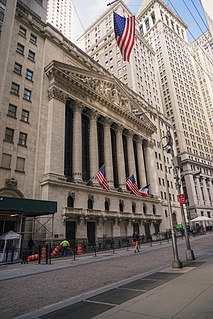A secondary market offering, according to the U.S. Financial Industry Regulatory Authority (FINRA), is a registered offering of a large block of a security that has been previously issued to the public. The blocks being offered may have been held by large investors or institutions, and proceeds of the sale go to those holders, not the issuing company. It is also called a secondary distribution. [1]
A secondary offering is not dilutive to existing shareholders since no new shares are created. The proceeds from the sale of the securities do not benefit the issuing company in any way. The offered shares are privately held by shareholders of the issuing company, who may be directors or other insiders (such as venture capitalists) who may be looking to diversify their holdings. Usually, however, the increase in available shares allows more institutions to take non-trivial positions in the issuing company which may benefit the trading liquidity of the issuing company's shares.
A secondary market offering should not be confused with a follow-on offering, otherwise known as a subsequent offering, or a dilutive secondary offering. In a follow-on offering, the company itself places new shares onto the market, thus diluting the existing shares. [2] [3] "Secondary market offering" can be understood as an offering on the secondary market, and is thus different from a secondary offering on the primary market — in other words, an offering following an initial, primary-market offering. A follow-on offering which is the second offering from a company can be understood as a secondary offering on a primary market, which is where the confusion between a dilutive (follow-on) and a non-dilutive secondary market offering possibly comes from. If a company were to make a third, primary-market offering, this would be a follow-on offering which is not a secondary market offering. "Secondary offering" as described in this article is an offering on the secondary market which is non-dilutive, and is thus not a follow-on offering.

A capital market is a financial market in which long-term debt or equity-backed securities are bought and sold, in contrast to a money market where short-term debt is bought and sold. Capital markets channel the wealth of savers to those who can put it to long-term productive use, such as companies or governments making long-term investments. Financial regulators like Securities and Exchange Board of India (SEBI), Bank of England (BoE) and the U.S. Securities and Exchange Commission (SEC) oversee capital markets to protect investors against fraud, among other duties.
The primary market is the part of the capital market that deals with the issuance and sale of securities to purchasers directly by the issuer, with the issuer being paid the proceeds. A primary market means the market for new issues of securities, as distinguished from the secondary market, where previously issued securities are bought and sold. "A market is primary if the proceeds of sales go to the issuer of the securities sold." Buyers buy securities that were not previously traded.

A financial market is a market in which people trade financial securities and derivatives at low transaction costs. Some of the securities include stocks and bonds, raw materials and precious metals, which are known in the financial markets as commodities.

A security is a tradable financial asset. The term commonly refers to any form of financial instrument, but its legal definition varies by jurisdiction. In some countries and languages people commonly use the term "security" to refer to any form of financial instrument, even though the underlying legal and regulatory regime may not have such a broad definition. In some jurisdictions the term specifically excludes financial instruments other than equities and Fixed income instruments. In some jurisdictions it includes some instruments that are close to equities and fixed income, e.g., equity warrants.
An initial public offering (IPO) or stock launch is a public offering in which shares of a company are sold to institutional investors and usually also to retail (individual) investors. An IPO is typically underwritten by one or more investment banks, who also arrange for the shares to be listed on one or more stock exchanges. Through this process, colloquially known as floating, or going public, a privately held company is transformed into a public company. Initial public offerings can be used to raise new equity capital for companies, to monetize the investments of private shareholders such as company founders or private equity investors, and to enable easy trading of existing holdings or future capital raising by becoming publicly traded.

A public company, publicly traded company, publicly held company, publicly listed company, or public limited company is a company whose ownership is organized via shares of stock which are intended to be freely traded on a stock exchange or in over-the-counter markets. A public company can be listed on a stock exchange, which facilitates the trade of shares, or not. In some jurisdictions, public companies over a certain size must be listed on an exchange. In most cases, public companies are private enterprises in the private sector, and "public" emphasizes their reporting and trading on the public markets.

A corporate action is an event initiated by a public company that brings or could bring an actual change to the securities—equity or debt—issued by the company. Corporate actions are typically agreed upon by a company's board of directors and authorized by the shareholders. For some events, shareholders or bondholders are permitted to vote on the event. Examples of corporate actions include stock splits, dividends, mergers and acquisitions, rights issues, and spin-offs.
In financial services, a broker-dealer is a natural person, company or other organization that engages in the business of trading securities for its own account or on behalf of its customers. Broker-dealers are at the heart of the securities and derivatives trading process.

The secondary market, also called the aftermarket and follow on public offering, is the financial market in which previously issued financial instruments such as stock, bonds, options, and futures are bought and sold. The initial sale of the security by the issuer to a purchaser, who pays proceeds to the issuer, is the primary market. All sales after the initial sale of the security are sales in the secondary market. Whereas the term primary market refers to the market for new issues of securities, and "[a] market is primary if the proceeds of sales go to the issuer of the securities sold," the secondary market in contrast is the market created by the later trading of such securities.

Security market is a component of the wider financial market where securities can be bought and sold between subjects of the economy, on the basis of demand and supply. Security markets encompasses stock markets, bond markets and derivatives markets where prices can be determined and participants both professional and non professional can meet.
A private investment in public equity, often called a PIPE deal, involves the selling of publicly traded common shares or some form of preferred stock or convertible security to private investors. It is an allocation of shares in a public company not through a public offering in a stock exchange. PIPE deals are part of the primary market. In the U.S., a PIPE offering may be registered with the Securities and Exchange Commission on a registration statement or may be completed as an unregistered private placement.

A rights issue or rights offer is a dividend of subscription rights to buy additional securities in a company made to the company's existing security holders. When the rights are for equity securities, such as shares, in a public company, it can be a non-dilutive pro rata way to raise capital. Rights issues are typically sold via a prospectus or prospectus supplement. With the issued rights, existing security-holders have the privilege to buy a specified number of new securities from the issuer at a specified price within a subscription period. In a public company, a rights issue is a form of public offering.
OTC Markets Group is an American financial market providing price and liquidity information for almost 10,000 over-the-counter (OTC) securities. The group has its headquarters in New York City. OTC-traded securities are organized into three markets to inform investors of opportunities and risks: OTCQX, OTCQB and Pink.

Securities regulation in the United States is the field of U.S. law that covers transactions and other dealings with securities. The term is usually understood to include both federal and state-level regulation by governmental regulatory agencies, but sometimes may also encompass listing requirements of exchanges like the New York Stock Exchange and rules of self-regulatory organizations like the Financial Industry Regulatory Authority (FINRA).
Stock dilution, also known as equity dilution, is the decrease in existing shareholders' ownership percentage of a company as a result of the company issuing new equity. New equity increases the total shares outstanding which has a dilutive effect on the ownership percentage of existing shareholders. This increase in the number of shares outstanding can result from a primary market offering, employees exercising stock options, or by issuance or conversion of convertible bonds, preferred shares or warrants into stock. This dilution can shift fundamental positions of the stock such as ownership percentage, voting control, earnings per share, and the value of individual shares.
A follow-on offering, also known as a follow-on public offering (FPO), is a type of public offering of stock that occurs subsequent to the company's initial public offering (IPO).
A seasoned equity offering or secondary equity offering (SEO) or capital increase is a new equity issued by an already publicly traded company. Seasoned offerings may involve shares sold by existing shareholders (non-dilutive), new shares (dilutive), or both. If the seasoned equity offering is made by an issuer that meets certain regulatory criteria, it may be a shelf offering.
An indication of interest (IOI), sometimes expression of interest (EOI), is an expression in finance that demonstrates a buyer's non-binding interest in buying a security in the stock market, often before it is available for purchase. IOIs are not required, but when a firm decides to issue one, they are primarily used on two occasions: before an IPO, and before an institution places a block trade.

In finance, stock consists of the shares of which ownership of a corporation or company is divided. A single share of the stock means fractional ownership of the corporation in proportion to the total number of shares. This typically entitles the shareholder (stockholder) to that fraction of the company's earnings, proceeds from liquidation of assets, or voting power, often dividing these up in proportion to the amount of money each stockholder has invested. Not all stock is necessarily equal, as certain classes of stock may be issued for example without voting rights, with enhanced voting rights, or with a certain priority to receive profits or liquidation proceeds before or after other classes of shareholders.

Securities market participants in the United States include corporations and governments issuing securities, persons and corporations buying and selling a security, the broker-dealers and exchanges which facilitate such trading, banks which safe keep assets, and regulators who monitor the markets' activities. Investors buy and sell through broker-dealers and have their assets retained by either their executing broker-dealer, a custodian bank or a prime broker. These transactions take place in the environment of equity and equity options exchanges, regulated by the U.S. Securities and Exchange Commission (SEC), or derivative exchanges, regulated by the Commodity Futures Trading Commission (CFTC). For transactions involving stocks and bonds, transfer agents assure that the ownership in each transaction is properly assigned to and held on behalf of each investor.










